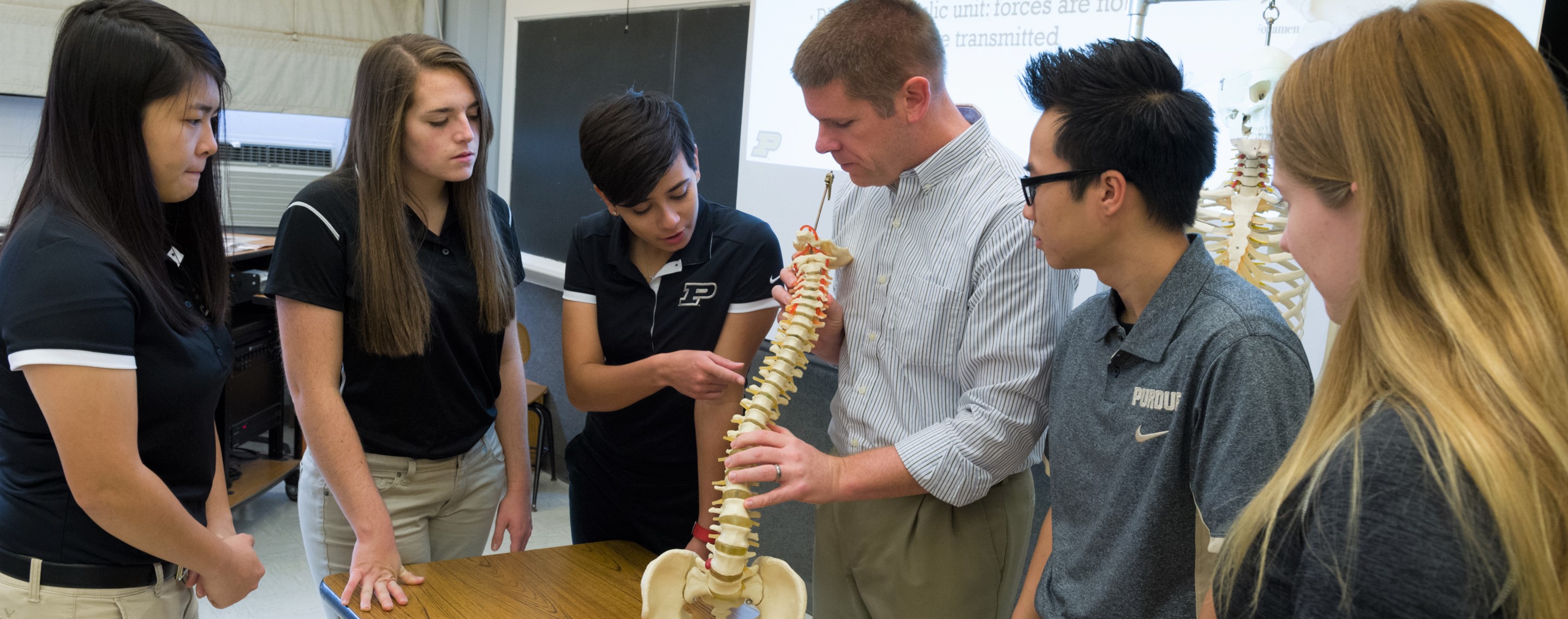Master of Science in Athletic Training Curriculum

The Master of Science in Athletic Training program (MSAT) requires 69 credit hours of coursework over five semesters to complete. The program starts in August and includes the summer between Year 1 and Year 2. Year 1 provides concentrated didactic education with integrated clinical experiences, while Year 2 offers immersive clinical experiences with supplemented didactic education. Upon completion, students meet all requirements to sit for the Board of Certification (BOC) examination. Students must maintain a minimum GPA in their graduate coursework to continue progression through the program.
The MSAT program requires the following courses:
|
Fall Semester, Year One |
||
|
Cr. |
Course # |
Course Title |
|
3 |
HK 50000 |
Introduction to Athletic Training Practice |
|
2 |
HK 50600 |
Evidence-Based Practice in Athletic Training |
|
4 |
HK 51500 |
Emergency Medical Management in Athletic Training |
|
3 |
HK 52000 |
Evaluation and Management of the Lower Quarter |
|
3 |
HK 53000 |
Evaluation and Management of the Upper Quarter |
|
2 |
HK 54100 |
Practicum in Athletic Training I |
|
Total Credit Hours: 17 |
||
|
Spring Semester, Year One |
||
|
Cr. |
Course # |
Course Title |
|
3 |
HK 53500 |
Athletic Training Interventions |
|
3 |
HK 54000 |
Evaluation and Management of the Spine and Head |
|
2 |
HK 54200 |
Practicum in Athletic Training II |
|
3 |
HK 54500 |
Therapeutic Modalities |
|
3 |
HK 55000 |
Evaluation and Management of Medical Conditions |
|
2 |
HK 58300 |
Patient Care Simulation in Athletic Training I |
|
Total Credit Hours: 16 |
||
|
Summer, Year One |
||
|
Cr. |
Course # |
Course Title |
|
2 |
HK 54300 |
Practicum in Athletic Training III |
|
2 |
HK 55500 |
Principles of Manual Medicine |
|
OR HK 59000 |
Specialty Certification in Athletic Training |
|
|
2 |
HK 56000 |
Advanced Procedures in Athletic Training |
|
Total Credit Hours: 6 |
||
|
Fall Semester, Year Two |
||
|
Cr. |
Course # |
Course Title |
|
2 |
HK 63000 |
Administration of Athletic Training Programs |
|
3 |
HK 63500 |
Injury Prevention and Health Promotion |
|
8 |
HK 64100 |
Practicum in Athletic Training IV |
|
2 |
HK 64500 |
Psychosocial Interventions in Athletic Training |
|
Total Credit Hours: 15 |
||
|
Spring Semester, Year Two |
||
|
Cr. |
Course # |
Course Title |
|
2 |
HK 64000 |
Leadership in Athletic Training |
|
6 |
HK 64200 |
Practicum in Athletic Training V |
|
3 |
HK 65000 |
Seminar in Athletic Training |
|
1 |
HK 66000 |
Diagnostic Imaging in Athletic Training |
|
3 |
HK 68300 |
Patient Care Simulation in Athletic Training II |
|
Total Credit Hours: 15 |
||
Clinical Education and Placement Opportunities
In your first year in the program, clinical education opportunities will be provided in a variety of settings at Purdue University and in the surrounding community. These experiences will be set with specific patient groups and populations to ensure you receive a well-rounded experience in the profession and gain both confidence and competence in difference athletic training settings. You can expect to be placed in different rotations on campus with our Purdue Athletics teams, in our on-campus rehabilitation clinic, or with one or more of our physicians. Additionally, you will spend time at one of our local high schools, a local Division III small college, in a tactical athlete clinic, and/or with one of our physician partners in the community. Since some of your experiences will be off-campus there will be a need for you to have reliable transportation options. Some of our clinical sites are on the local bus lines, but not all.
In the summer, you will have a variety of general medical rotations to learn how to care for patients with non-orthopedic conditions. These will occur off campus in the local West Lafayette/Lafayette area.
In your final year, you can expect full or near full immersion into 1-2 different settings. Since you will have completed all of your required experiences over the summer and in year one, you can now have some choice in what your second year will look like. Your classes will be offered in a synchronous and asynchronous online format which now allows you to immerse in your clinical education applying everything you've learned up to this point. This format also allows you to perform your clinical experiences anywhere in the country. Of course, if you want to stay at Purdue or in the local community, you can. But we can also tap into our alumni network to place you in a wide variety of settings across the nation. Please note: you may incur additional housing and transportation costs if you pursue clinical education opportunities in locations outside the local West Lafayette/Lafayette area.
We invite you to connect with us to learn more about how your clinical education pathway will work while in the Purdue MSAT program.